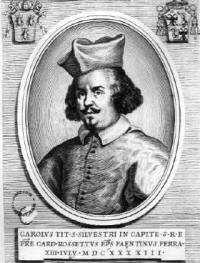Carlo Rossetti

Carlo Rossetti (1614 – 23 November 1681) was an Italian Catholic Cardinal who went to London as a secret nuncio on behalf of Pope Urban VIII. While in London, he used the pseudonym Count Charles Rossetti and was referred to even as Prince Rossetti (as was the Italian fashion), having styled himself as an Italian nobleman rather than as a representative of the Roman Catholic Church to avoid persecution.
Early life
Born of a noble family in Ferrara, Rossetti went to Rome as a young man and was employed as a prelate to Pope Urban VIII and his Barberini family, especially his nephews Francesco Barberini and Antonio Barberini.[1]
As nuncio in London
The Barberini were impressed by his vigour and energy and sent him as nuncio first to Germany, then to England where he provided financial support to Irish Catholics fighting against the Parliament of England. His mission was undertaken incognito as one Italian historian recalled:[2]
| “ | There arrived, at London to reside at the court as a gentleman traveller, sent by Cardinal Barberini, but effectively he was the Pope's nuncio, by name Charles Rossetti, an earl by birth who had taken upon him the church habit of a prelate; who was of a great spirit, active and prudent, able to undertake business of the greatest difficulty. He was valorous of heart, had a learned tongue, was quick in parts; in brief, he was such and one that his fellow could not be found in all the Court of Rome. | ” |
Rossetti's mission was considered especially dangerous, given the conflict between the Church and England at the time. Even contemporary Italian authors dared not publish his real identity for fear the prelate's life may be threatened.[3] But Rossetti's clandestine mission was successful in many regards. He managed to convince some at the English court to banish Roman Catholic priests from England, rather than execute them. When contemporary detractors suggested King Charles I of England and his Archbishop William Laud were papists, Rossetti bravely took the opportunity to suggest the King might consider converting to Catholicism, seeing as though he was being accused of as much anyway.
Charles' Queen, Henrietta Maria, saw Rossetti's position at court as potentially advantageous and, having developed a social relationship with the clandestine nobleman, urged the prelate to write to the uncle of his Barberini patrons, Pope Urban VIII, asking for the equivalent of £100,000 pounds sterling to aid England's ailing coffers. The Pope responded saying he was,[3] "...very ready to supply the King so soon as ever he should declare himself a Catholic".
When the bill of attainder was passed and Archbishop William Laud was sentenced to death, some suggested Laud would have been better off had he converted to Catholicism and escaped to Rome (as Rossetti had urged) rather than staying to fight for which he was executed.[3]
Return to Rome
At the outbreak of the First Bishops' War, Rossetti's life was threatened and he took refuge in the castle of the mother of Queen Henrietta Maria. Thereafter he was summoned to appear before the House of Commons of England but instead fled England at the end of June 1641.[4] He went to Flanders with the assistance of the Venetian ambassador and then returned to Rome and to the service of the Barberini.
When he returned to Rome they engineered his ordination as Archbishop of Tarsus in 1641 and in 1643 he was elevated to Cardinal by Pope Urban. Pope Urban died in 1644 and Rossetti participated in the Papal conclave of 1644. Despite his understandable support for the French nominee, Giulio Cesare Sacchetti, Rossetti was not punished too severely when Giovanni Battista Pamphili took office as Pope Innocent X. He was installed as Cardinal-Deacon of the San Cesareo in Palatio later in 1644.
He served as Cardinal-Deacon at a number of other churches including the Santa Maria in Via Lata (1653) and the San Silvestro in Capite (1654). There he remained for 18 years until his appointment as Cardinal-Deacon at the San Lorenzo in Lucina in 1672. Between 1654 and 1656 he was named Camerlengo of the Sacred College of Cardinals.
However, during the papal conclave of 1655, Rossetti spoke ill of Cardinal Fabio Chigi.[5] When Chigi was elected to the papal throne as Pope Alexander VII, Rossetti went into exile and did not return to Rome for any significant length of time until the papal conclave of 1667.
Rossetti later participated in the papal conclaves of 1669–1670 and 1676.
He was appointed Cardinal-Bishop of Frascati in 1676 and finally, Cardinal-Bishop of Porto-Santa Rufina in 1680 before his death on 23 November 1681.[6]
See also
- Gregorio Panzani, another agent sent to England by Antonio Barberini
References
- ↑ Carlo Rossetti by S. Miranda (Florida International University, last updated May 2012)
- ↑ Il Conte Bisaccione, Delle Guerre Civili d'Inghilterra (1653), 2nd edition
- ↑ 3.0 3.1 3.2 Pope Alexander the Seventh and the College of Cardinals by John Bargrave, edited by James Craigie Robertson (reprint; 2009)
- ↑ The outbreak of the Irish Rebellion of 1641 by M. Perceval-Maxwell (McGill-Queens, 1994)
- ↑ Sede Vacante 1667 by John Paul Adams (California State University, last updated April 2010)
- ↑ Carlo Cardinal Rossetti by David M. Cheney (Catholic Hierarchy, last updated September 2012)
| Catholic Church titles | ||
|---|---|---|
| Preceded by Giangiacomo Teodoro Trivulzio |
Cardinal-Deacon of San Cesareo in Palatio 1644–1653 |
Succeeded by Friedrich von Hessen-Darmstadt |
| Preceded by Girolamo Colonna |
Cardinal Deacon of San Silvestro in Capite 1654–1672 |
Succeeded by Gasparo Carpegna |
| Preceded by Virginio Orsini |
Cardinal-Bishop of Frascati 1676–1680 |
Succeeded by Alderano Cybo |
| Preceded by Cesare Facchinetti |
Cardinal-Bishop of Porto-Santa Rufina 1680–1681 |
Succeeded by Niccolò Albergati-Ludovisi |
|